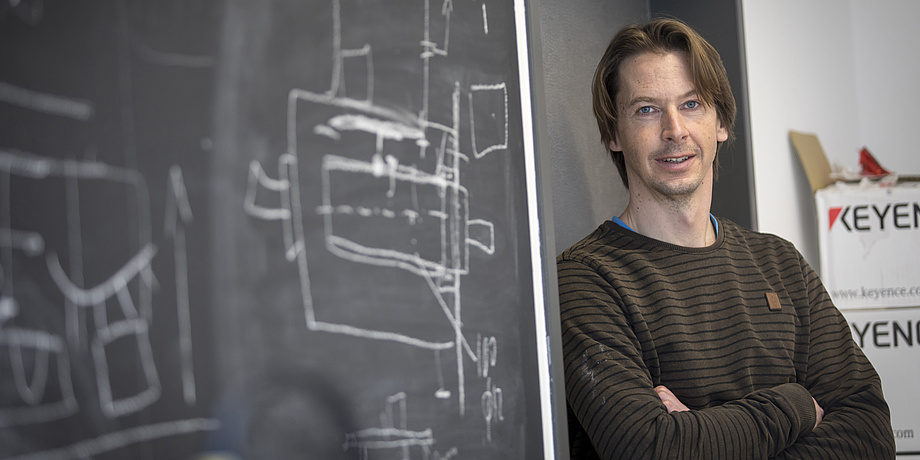Sensor systems allow us to detect things that we would otherwise not be able to perceive. Alexander Bergmann has focused on detecting particularly small dust particles in the air and is developing innovative sensor concepts and materials for this purpose. And not without success. With twelve patents already under his belt, the researcher and head of the Institute of Electrical Measurement and Sensor Systems was the most successful inventor at TU Graz from 2018 to 2022, for which he was awarded the Nikola Tesla Medal.
This was the award ceremony for the most successful inventors at Graz universities.
Childhood dream
His career as an inventor basically began in his childhood bedroom, where as a boy he spent afternoons dreaming of flying bicycles and how he could invent them. “I imagined it like in the comics: I sit in a quiet little room like Daniel Gyro Gearloose, thinking, inventing and possibly building something myself,” he says today, laughing with the dreamy look of a small boy with big dreams. Back then, he mainly wanted to invent mechanical things – like a flying bicycle. At the beginning of his studies, medical sensor technology was an important concern of his – that was before his inventive spirit focused primarily on environmental sensor technology for detecting tiny particles and air quality and new materials for innovative sensor concepts. And his view of the inventor’s craft has also changed: “It’s not at all as lonely as I imagined,” he says with a laugh. “Research is teamwork and without my excellent team, nothing could be created.” He talks about conversations in the office kitchen, where in large groups ideas emerge and thoughts are developed that flow into research. And about a doctoral student who is now a division manager at a large Styrian company, with whom several patents have already been jointly developed. Or another doctoral student who was so fascinated by working on patents that he is now training to become a patent agent. Alexander Bergmann prefers to put others on a pedestal rather than himself.
The craft of patenting
He sees submitting and being granted patents primarily as a craft that he learnt during his 15 years at an industrial company. “For me, a patent is one step further than a scientific publication. There needs to be a much stronger focus on the added value for the company.” As an example, he cites a patent together with the Graz-based company AVL Ditest, which produced a system for measuring particulate matter in workshops and made the company the global market leader in this field. He sees a lot of potential for more and more patents at TU Graz, but the knowledge of the process, exact formulations and ultimately costs could be expanded. “For example, it is important to pay attention to the processes. If a result has already been published, it can no longer be patented. These processes must always run in parallel. And ultimately it is also a question of costs. An international patent costs 30,000 to 50,000 euros. This makes it all the more important to get the corporate partners on board right from the start and show them the options.”
Structured materials for sensor technology
Many of the patents in recent years have resulted from preliminary work in the recently opened CD Laboratory for Structured Matter-Based Sensing. The laboratory, which Graz University of Technology (TU Graz) has recently started running jointly with the University of Graz, focuses on the fundamentals and applications of structured materials and light fields that can be used in sensor technology.
The University of Graz and TU Graz launch joint Christian Doppler lab for innovative sensors
This research area is anchored in the Field of Expertise “Sustainable Systems”, one of five strategic foci of TU Graz.
You can find more research news on Planet research. Monthly updates from the world of science at Graz University of Technology are available via the research newsletter TU Graz research monthly.

